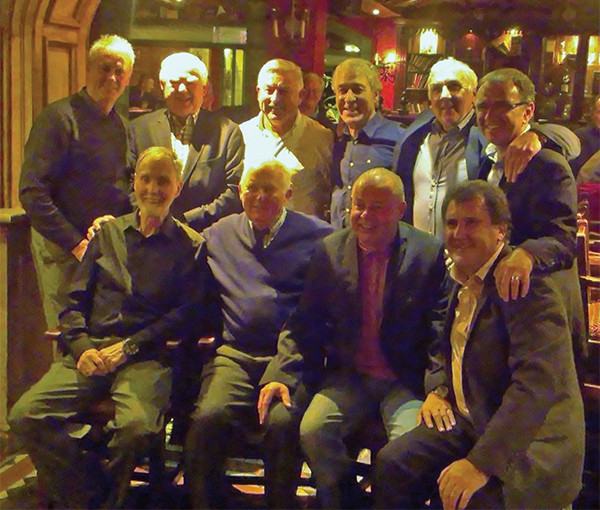
Above: Back row, from left to right: Mick Byrne, John Keogh, Pat Byrne, Mick Lawlor, Paddy Mulligan, Pat Fenlon (current manager)
Front row, from left to right: Mick O’Connell, Mick Kiernan, Robbie Gaffney, Mick Leech.
Photo courtesy Teresa Beausang.
A surprise event organised by the Shamrock Rovers’ Heritage Trust took place on November 18th in Clonskeagh House to thank a number of former players for their contribution to the club and to acknowledge a member of the team behind the team: Michael O’Connell from Beech Hill.
Surrounded by friends and family, he accepted a plaque to mark 16 years of dedicated service as their kit man. NewsFour caught up with Michael a few days later and he shared some of his fondest and most vivid memories with me.
At 16, Michael attended Miltown School, which was situated opposite the original Shamrock Rovers grounds. Joe Byrne was groundsman there and he took the time one afternoon to show a curious young Michael how to mark the grounds; his interest was piqued and after a few months turning up after school, the Cunninghams offered him a job.
The green and white ‘hoops’ became Michael’s responsibility. On Mondays he cleaned the muck-hardened boots in a big sink, stuffing them with paper to dry them and finally, adding a coat of Dubbin which left them ready, shiny and waterproofed, for the next game.
After every Tuesday and Thursday training session he packed the skips with 12 jerseys, nicks, and pairs of socks to be brought to the launderette. Once, when an unplanned mid-week match came up and the kit was not back from the Swastika Laundry in time, he arrived home with a big bag of towels and socks for his mother; never before did her clothes line attract such attention.
Michael recalls the away matches in the early years in all their excitement and style. The Rovers always travelled by train, occupying the two carriages nearest to the guard’s carriage. The players and back room staff all wore grey slacks, navy blazers, white shirts and the Rovers’ tie. It was Michael’s job to stand at the carriage door before the players arrived and explain to passengers that the carriages were reserved. He was often asked for an autograph, usually explaining that he just looked after the kit until Liam Tuohy advised him to sign the autograph, if that’s what they wanted.
Michael chuckled as he remembered how the players were served pasta as the train pulled out of the station, while himself, Billy Lord, the club secretary and The Cunninghams all sat down to enjoy a mouthwatering Sunday lunch – it wasn’t all scrubbin’ and Dubbin.
There was nothing unusual about a Rovers’ match attracting a crowd of 22,000 in those days, and a great many of the fans who attended travelled by bicycle. The image of thousands of bikes parked outside the stadium is etched in his memory and only one man dealt with all the bikes, issuing each owner a ticket. At the end of the match, people poured out of the stadium and, with the infallible system of the bicycle man, they always managed to relocate their two-wheeled wagons.
A man who also worked hard behind the scenes was physio Billy Lord. Michael sets the scene: a big white table in the middle of the changing rooms, the smell of Wintergreen and cigarettes. As Billy rubs Wintergreen into a player’s leg, a cigarette trembling between his lips, the ash falls on to the player’s skin but before any protest is heard, Billy massages it in, assuring him it’d do no harm.
Michael’s favourite memory over the years was when Rovers qualified for the Europa League and he and Eileen travelled to Estonia for this record-breaking event. Other highlights included meeting some famous faces and legends: John Toshack, Alan Ball, George Best, Franz Beckenbauer and Denis Law.
Michael acknowledged the support his parents gave him; on the morning of every away match he woke early to get 7am mass in the convent in Milltown, but not without first sitting down to a fry his mother made him. Michael showed NewsFour the plaque, a look of contentment spread across his face. We’ve no doubt it is the same look of a young man walking to early mass on a summer Sunday some 40 years before.
By Teresa Beausang



